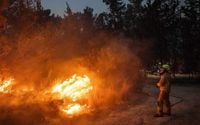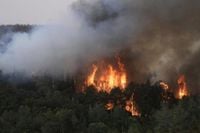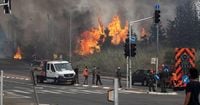Wildfires raging near Jerusalem have prompted a national emergency declaration as Israeli authorities scramble to control the flames that threaten communities and vital infrastructure. On April 30, 2025, Israeli Defense Minister Israel Katz ordered the military to deploy troops to assist firefighters battling the rapidly spreading blazes, which have already forced evacuations and road closures.
In a statement, Katz emphasized the seriousness of the situation, stating, "We are facing a national emergency, and all available forces must be mobilized to save lives and bring the fires under control." The Israeli rescue agency Magen David Adom (MDA) reported that hundreds of civilians were at risk from the fires, with emergency services working tirelessly to provide medical support.
As the wildfires escalated, Israeli police closed the main Jerusalem-Tel Aviv highway, evacuating residents along the route. Communities located about 30 kilometers (19 miles) west of Jerusalem were cleared out, reflecting the urgent need for safety as flames erupted in areas ravaged by blazes just a week prior. High temperatures and strong winds have fueled the fires, prompting evacuations from at least five communities.
Emergency services reported no casualties at this stage, although MDA confirmed that at least 23 people had been treated for smoke inhalation and burns, including two pregnant women and two infants. The situation has been described as critical, with MDA raising its alert level to the highest tier.
Prime Minister Benjamin Netanyahu has warned that the wildfires could reach Jerusalem, stating, "The western wind can push the fire easily toward the outskirts of Jerusalem - and even into the city itself." He urged for increased firefighting resources, highlighting that "the priority right now is defending Jerusalem." Videos and images circulating on social media showed thick smoke billowing over the surrounding hills and people abandoning their vehicles as they fled the flames.
Israel’s Air Force has joined firefighting efforts, deploying aircraft to assist ground teams. The military has reported that firefighting teams and fire engines are working in tandem with aircraft that have already dropped more than 95 firefighting charges in an effort to extinguish the fires.
In response to the escalating crisis, Fire and Rescue services have prohibited lighting fires in open areas across the country for the next week. They have warned civilians to avoid reaching prohibited areas, emphasizing the danger posed by the ongoing wildfires.
As the fires spread, reports indicate that the situation may have been exacerbated by intentional acts of arson. Eli Beer, president of the United Hatzalah emergency response organization, noted that fires were ignited in 20 separate locations, suggesting a coordinated attack. Security sources have confirmed that several arrests have been made in connection with the fires, including individuals suspected of attempting to ignite new blazes.
National Security Minister Itamar Ben Gvir described the situation as a national emergency, echoing calls for an immediate and robust response. Likud lawmaker Dan Illouz has called for an immediate closure of Judea and Samaria, advocating for a strong response to the fires.
According to reports, 155 firefighting teams are currently operating at full capacity in the area of Shfelet Yehuda, with additional support from volunteers and emergency services. The firefighting efforts have been hampered by high winds, which are expected to intensify, potentially reaching speeds of up to 100 kilometers per hour.
As the fires continue to rage, the Israeli government has reached out to several countries for assistance, including Italy and Croatia, which are expected to send firefighting planes. Israel has also appealed to Greece, Cyprus, and Bulgaria for additional support.
The wildfires have disrupted national events, forcing the cancellation of Memorial Day ceremonies marking fallen soldiers and other Independence Day celebrations. Authorities have urged the public to stay at home, minimize physical activity, and stay hydrated during this critical period.
In a broader context, experts have warned that Israel's preparedness for such disasters remains inadequate. Dov Ganem, chairman of the Israel Fire and Air Rescue Association, has long criticized the state’s lack of readiness for massive fires, citing insufficient manpower and resources. Reports indicate that the number of firefighters and firetrucks in Israel is significantly lower than in developed countries of similar size, leading to challenges in adequately responding to large-scale emergencies.
As the situation unfolds, Israeli authorities are working diligently to establish defensive lines to prevent the fire from spreading further into populated areas. The community response has been commendable, with thousands of volunteers stepping up to assist in evacuation and firefighting efforts.
The Israeli government faces mounting pressure to address the underlying issues contributing to the fire risk, including climate change and inadequate infrastructure. With the threat of wildfires expected to grow in the coming years, officials are urged to take decisive action to protect lives and property.
As firefighters continue to battle the blazes, the hope remains that the situation will stabilize in time for Independence Day celebrations, transforming a day of mourning into one of resilience and unity against the backdrop of adversity.






